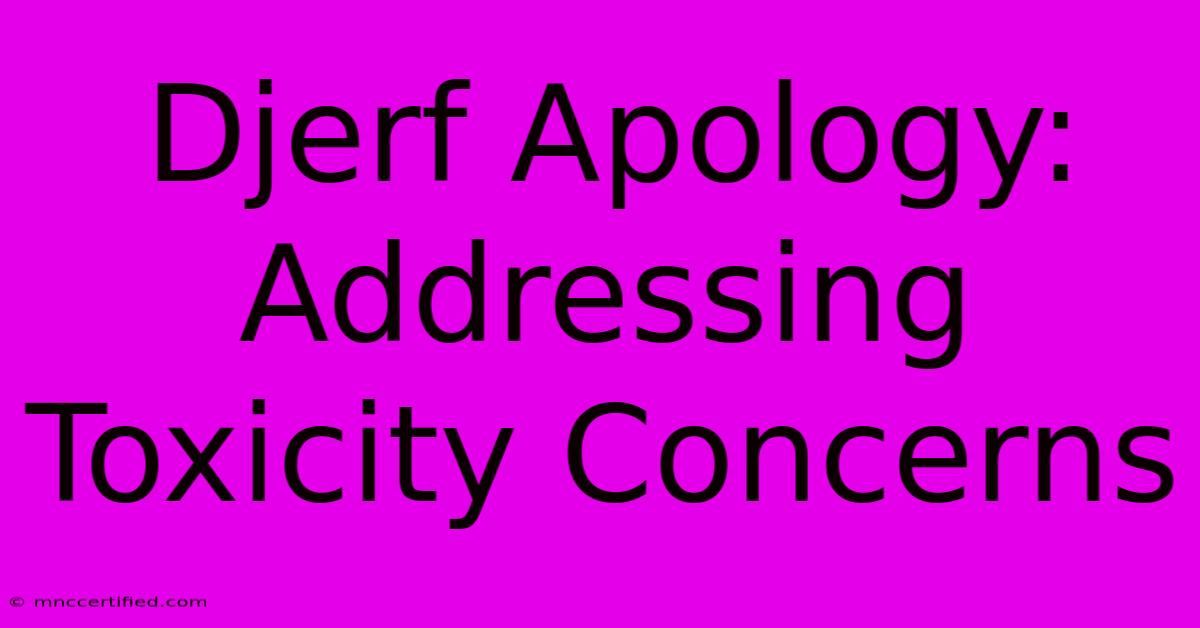Djerf Apology: Addressing Toxicity Concerns

Table of Contents
Djerf Apology: Addressing Toxicity Concerns
The recent controversy surrounding influencer and entrepreneur, Djerf Avenue (commonly known as Djerf), has sparked widespread discussion about online toxicity and the responsibility of public figures. This article delves into the specifics of the apology, analyzes its effectiveness, and explores the broader implications for the influencer landscape.
Understanding the Controversy
Before diving into the apology itself, it's crucial to understand the events that led to the outcry. While the specifics may vary depending on the source, the core issue revolved around allegations of toxic workplace behavior and unprofessional conduct. These allegations included claims of:
- Unrealistic expectations and pressure on employees: Reports surfaced suggesting an intense and demanding work environment, leading to burnout and mental health issues among staff.
- Lack of respect and unprofessional communication: Accounts described instances of disrespectful treatment and inappropriate communication from Djerf and/or her team.
- Issues with compensation and benefits: Some accounts alleged discrepancies or shortcomings in employee compensation and benefits.
These accusations, disseminated across various social media platforms and online forums, significantly damaged Djerf's public image and led to a widespread call for accountability.
The Apology: A Critical Analysis
Following the intense backlash, Djerf issued a public apology. The effectiveness of this apology is a subject of ongoing debate. While some praised Djerf for acknowledging her shortcomings, others criticized the apology for being insufficiently specific or lacking genuine remorse.
What the Apology Included (Generally):
- Acknowledgement of wrongdoing: The apology generally acknowledged the existence of issues within her company culture.
- Expression of regret: Djerf expressed remorse for the harm caused to her employees and followers.
- Promise of change: The apology typically included a pledge to implement changes to improve workplace culture and prevent future issues. This often involved promises of better communication, improved employee support, and more transparent practices.
Shortcomings of the Apology (Common Criticisms):
- Lack of specificity: Many felt the apology lacked concrete details about the specific actions taken to address the issues. Vague promises of change were insufficient for many critics.
- Insufficient accountability: Some argued that the apology lacked a clear acceptance of personal responsibility for the toxic environment.
- Insincere tone: The perceived tone of the apology played a significant role in determining its effectiveness. A tone deemed insincere or defensive further fueled criticism.
The Broader Implications
The Djerf situation highlights crucial issues within the influencer industry and beyond:
- The responsibility of public figures: Influencers, with their significant reach and impact, have a responsibility to maintain ethical standards and create positive workplace environments.
- The importance of accountability: Addressing toxic workplace culture requires more than just issuing an apology. Genuine accountability, including concrete actions to address the root causes of the problems, is essential.
- The power of social media: Social media plays a crucial role in both exposing and amplifying instances of toxic behavior, holding individuals and organizations accountable.
Moving Forward: Lessons Learned
The Djerf controversy serves as a cautionary tale for influencers and businesses alike. Building a successful brand requires not only creating engaging content but also fostering a positive and ethical workplace culture. Transparency, accountability, and a genuine commitment to addressing employee concerns are vital for long-term success and maintaining a positive public image. Future apologies must move beyond vague expressions of regret and commit to tangible changes that demonstrate a real commitment to improvement. The focus should be on proactive steps, fostering a healthy work environment, and prioritizing employee well-being.
Keywords: Djerf, Djerf Avenue, apology, influencer, toxicity, workplace toxicity, online toxicity, social media, accountability, responsibility, ethical considerations, brand image, public relations, crisis management, employee well-being, toxic work environment, workplace culture.

Thank you for visiting our website wich cover about Djerf Apology: Addressing Toxicity Concerns. We hope the information provided has been useful to you. Feel free to contact us if you have any questions or need further assistance. See you next time and dont miss to bookmark.
Featured Posts
-
Calm In Turin Juventus Must Beat Cagliari
Dec 18, 2024
-
Matilda Djerf Accused Of Psychological Terror
Dec 18, 2024
-
First Bluey Movie Theater Release
Dec 18, 2024
-
Mc Ilroy Scheffler Top De Chambeau Showdown 2024
Dec 18, 2024
-
Vanuatu Hit By Deadly Earthquake
Dec 18, 2024